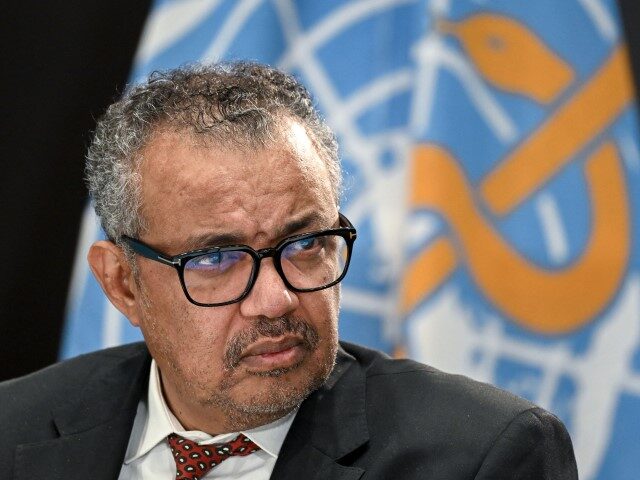The House of Representatives passed a bill on Wednesday to ensure President Joe Biden, potential successor Kamala Harris, or any other executive does not unilaterally enter the United States into a future “pandemic treaty” binding it to the World Health Organization (W.H.O.).
The “No W.H.O. Pandemic Preparedness Treaty Without Senate Approval Act,” introduced by Rep. Tom Tiffany (R-WI) in 2023, is a response to efforts beginning in 2021, at the height of the Wuhan coronavirus pandemic, to create some form of international binding legal document, spearheaded by the W.H.O., regulating how nations handle international health emergencies, including pandemics.
A draft version of the accord exists but, as of May 2024, W.H.O. member states have not agreed on a final document to implement as international law. Critics have warned that such a document would present a threat to the national sovereignty of party nations, as provisions debated for the treaty include mandated “equitable” distribution of medical intellectual property and granting the W.H.O. greater power to declare medical emergencies in countries, potentially without the consent of the relevant government.
W.H.O. Director-General Tedros Adhanom Ghebreyesus, a fierce advocate for the pandemic treaty, has claimed any concerns regarding sovereignty are “misinformation” and granting the W.H.O. greater power over domestic public health regulation is actually “an exercise of sovereignty.”
Rep. Tiffany’s bill passed the House with 219 votes to 199, including four Democrats: Reps. David Scott (D-GA), Marie Gluesenkamp Perez (D-WA), Jared F. Golden (D-ME), and Donald G. Davis (D-NC). If it becomes law, the bill would mandate that the United States government treat any W.H.O. international accord on pandemics as a treaty, whether presented as a treaty or labeled otherwise.
While the constitution requires all treaties, defined as binding agreements with foreign powers, to be passed through a two-thirds vote in the Senate, the bill in question is a safeguard prompted by the fact that the parties drafting the proposed “pandemic treaty” cannot even agree on what to call the document. The U.N. health agency is currently describing the draft document as the “W.H.O. convention, agreement or other international instrument on pandemic prevention, preparedness and response,” or “WHO CA+.”
The safeguard is also in response to past presidential administrations, most prominently that of former President Barack Obama, simply disregarding constitutional requirements by not submitting major international agreements to the Senate for approval, such as the Paris Climate Agreement and the Joint Comprehensive Plan of Action (JCPOA, or Iran nuclear deal). Both were labeled “executive agreements” rather than “treaties,” allowing the sidestepping of Congress.
“It’s deeply concerning that the Biden-Harris administration would even consider signing the World Health Organization’s pandemic treaty,” Rep. Tiffany said in a statement to reporters on Wednesday. “We cannot stand by as they attempt to surrender control of our public health system to unelected bureaucrats at the W.H.O. and the UN.”
“This legislation is essential to protecting our nation’s sovereignty and ensuring that the safety of American citizens remains in the hands of the U.S., not a corrupt international organization,” he added.
On Wednesday Rep. Chris Smith (R-NJ), a co-sponsor of the bill, described the attempt at a W.H.O. pandemic treaty as “an absolute power grab by a troubled U.N. agency that is in the pocket of China’s Communist dictator Xi Jinping.”
“This important legislation will help ensure that there is extensive and rigorous review by the American people,” he added, “who would be forced to foot the bill for any treaty commitments—and sufficient public debate by members of the Senate before any agreement can be made by the Biden-Harris Administration.”
Senior Biden-Harris administration officials have described themselves as being committed to ensuring that an international pandemic agreement in some form passes; Secretary of State Antony Blinken has declined to commit to presenting the agreement to Congress if the W.H.O. ultimately agrees on a document.
In 2023, during that year’s discussion of the provisions in the agreement, Biden’s representative to the Intergovernmental Negotiating Body (INB) drafting the pandemic accord, Pamela Hamamoto, told those assembled, “the United States is committed to the Pandemic Accord, to form a major component of the global health architecture for generations to come.”
“Shared commitment, shared aspirations and shared responsibilities will vastly improve our system for preventing, preparing for, and responding to future pandemic emergencies,” she added.
At a hearing in May, Rep. Smith asked Blinken if the Biden administration was planning to label the pandemic accord an “executive agreement,” as Obama had done with various instruments, to bypass Congress. Rather than answer the question. Blinken expressed pessimism that the W.H.O. would ever successfully agree on a single pandemic accord document.
“On the pandemic agreement, the way things stand right now, I don’t see that coming to a conclusion in the near term,” Blinken said. “There’s just not consensus on it. It’s something we continue to work on, but continue to work on making sure that we uphold our own interests and values, including on, for example, intellectual property.”
The W.H.O.’s negotiating body did not, in fact, ultimately agree on a draft pandemic accord, despite taking extra time in May to deliberate. Major points of discord are provisions demanding “equity” in access to medical technology, which would require wealthier states to share intellectual property with poorer states for free, in addition to paying for significant medical provisions and technology for poorer states.

COMMENTS
Please let us know if you're having issues with commenting.